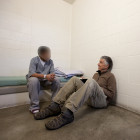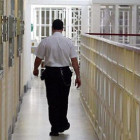
Richard Ross is a busy guy. Catch him, if you can, dashing to, through or from, an airport. He’s always on the go.
But then again, if you plan on visiting 300 youth detention facilities across the nation, taking photos of more than 1,000 young people and administrators, then you don’t really have time to stand around and chat, for long anyhow.
One’s photography does not appear in more publications than you can shake a Canon 5D at -- from Harpers to Architectural Digest -- by being lazy. You don’t sit on your butt on the way to having your photos shown at galleries from The Tate Modern in London, to the High Museum in Atlanta. You don’t loaf around and end up publishing books, such as the Architecture of Authority and Waiting for the End of the World and get them introduced by the likes of John MacArthur and Sarah Vowell, by slacking.
And in between, if you are Ross, well you don’t really have down time, because there’s that class you have to teach at U.C. Santa Barbara.
It’s a good thing he approaches his work with the energy of a teenager, but it’s a better thing that he does it with the practiced eye and maturity of his 64 years. With that combination, comes not only care for his art and what’s in it, but the subjects and subject beyond the images. See it across his body of work.
His latest, and the object of his profound care for the past five years, is a project he calls Juvenile-In-Justice. This is what has taken him to those many detention centers scattered across 30 states. After 40 years of working in photography, he’s turning his attention, and his lens, he says, to the juvenile justice system.
The point of this exercise? He does not even attempt to blur his motivation. It is, quite simply, to “instigate policy reform.”
With his stunning photos it is hard to see how he will fail:
Ross’ work begins appearing this week on this page as well as our new arts page, Bokeh. Twice a week, you’ll see new images of his work on the JJIE site, where a link will take you to a larger body of his work on the Bokeh site. The images, all of youth inside detention centers, will include cutlines telling you enough about the teen for you to get a feel of their, and Ross’, humanity.








